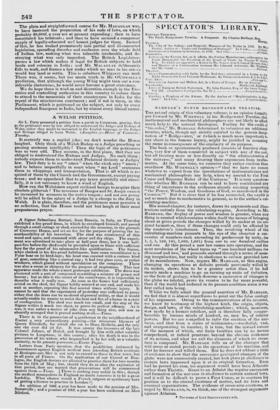A Signor Sebastiano Botturi, from Brescia, in Italy, on Thursday
exhibited a fire-proof dress, in which be enveloped himself, and passed through a small cottage or shed, erected for the occasion, in the grounds of Cremorne House, and set on fire for the purpose of proving the in- combustibility of his invention. The shed was constructed of thin wood and spars, and crammed with straw and dry chips. The experi- ment was advertised to take place at half-past three, but it was hulf- past five before the shed could he prevailed upon to blaze with sufficient fury for the proof of his salamander-like qualifications. The Signor, when clothed in his fire-proof habiliments, bore some resemblance to a Polar bear on its bind-legs ; his head was covered with a curious kind of gear, something like a conical cap • it had two glass eyes, or rather windows, which glared without speculation on the company. There was also a snout or chimney for the purpose of respiration. This last apparatus made the whole a most grotesque exhibition. The dress was plastered with a sort of compound resembling a mixture of grease and mortar ; but as this is the secret of the contrivance, it is impossible to describe what it really was. As soon as the flames had sufficiently seized on the shed, the Signor boldly entered at one end, and made his exit at another, repeating this feat several times without injury. It cannot be said that the experiment of yesterday was sufficient to prove either that the dress can be rendered of general utility, or that it would actually enable its wearer to resist the heat and fire of a house in a state of conflagration. The shed was much too small, and the stay of the Signor within it much too short, to prove its perfect efficacy. As it was, it was rather a matter of joke than any thing else, and was so absurdly arranged that it proved nothing at all.— Tunes.
There is in the possession of a gentleman in the neighbourhood of Exeter a very extraordinary painting—the miniature likeness of Queen Elizabeth, for which she sat to Hans Holbein, and the only one she ever did sit for. It was among the treasures of the late Colonel Johnes, of litifod, and brought by him with other valuable pictures to Langstone, in this county ; after his death it was in the possession of his widow, who bequeathed it by her will, as a valuable curiosity, to its present possessor.—Exeler Paper. Letters from Paris mention, that the prohibition intimated by Government against English medical men attending British residents at Boulogne-sur-Mer is not only to extend to those in that town, but in all parts of France. On the application of our Consul at Bou- logne, the English doctors are allowed to practise there for two months from the 12th of May ; but, should they do so after the expiration of that period, they are warned that prosecutions will be commenced against theni.—Tiaies. [There is nothing very unfair in this ; though the medical monopolists in England no doubt conceive it to be a great hardship. What chance would a French surgeon or apothecary have of getting a licence to practice in London ?] An addition of 100/. a year has been made to the pension of Mrs. Somerville ; and a pension of 1001. a year has been conferred on Miss Mitford.


























 Previous page
Previous page